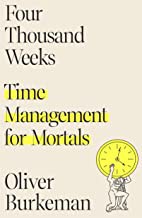MH Thaung recenzis Four Thousand Weeks de Oliver Burkeman
Living ever-busier lives within a finite length of time
I’ve previously read a couple of books by this author. Although that was several years ago, I did remember liking those books well enough to pick up this one when it came across my radar.
The author offers a different perspective on time, “time management” and our relationship with them both. He addresses several factors such as increasing distractions and evolving attitudes to work-time vs not-work-time. Ironically, I read most of this book at one sitting during a power cut when I had no PC/internet access, rendering my usual distractions inert!
He seems to cover mainly internal motivations/stressors rather than external ones, so one might not be able to take his suggestions on board wholesale. Still, I found plenty to mull over. I’ll probably revisit sections further down the line.





